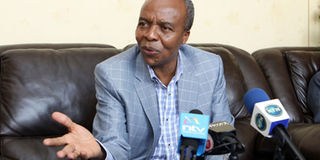Kenya to sink Sh10bn into land for new railway

Infrastructure and Transport Cabinet Secretary Michael Kamau. PHOTO | FILE
What you need to know:
- The cash is part of the proceeds from a fund into which importers pay one per cent of value of goods
- Eleven thousand acres will be compulsorily acquired from individuals and government agencies along the 609-kilometre Nairobi-Mombasa stretch.
Compulsory acquisition of land for the first phase of the standard gauge railway line from Mombasa to Nairobi will cost Sh10 billion.
The money is part of proceeds of the Railway Development Fund (RDF) introduced by the government in December 2012.
Importers and exporters contribute one per cent of the total value of their products to the fund, which has so far raised Sh22.9 billion.
“We have paid about Sh6.6 billion of the Sh10 billion we need for land acquisition. We are also using the money for the commuter rail. RDF continues throughout the life of the project,” Transport and Infrastructure Cabinet Secretary Michael Kamau said.
Eleven thousand acres will be compulsorily acquired from individuals and government agencies along the 609-kilometre Nairobi-Mombasa stretch.
Eight counties — Mombasa, Kilifi, Kwale, Taita-Taveta, Makueni, Kajiado, Machakos and Nairobi — will be affected by the major infrastructure project.
BUSINESS OPPORTUNITIES
Mr Kamau spoke Monday during the standard gauge railway symposium, convened to highlight the business opportunities arising from the project’s implementation process.
The minister promised timely delivery of the project.
“I am instructed to complete the project by June 1, 2017. The project will be delivered in 35 months and two weeks’ time,” Mr Kamau said.
The idea is for the first train to pull out of Mombasa on June 1, 2017 — Madaraka Day.
The project's contractor, China Road and Bridge Corporation (CRBC), has entered into an agreement with the Kenya Railways Corporation (KRC) — the government’s implementing agency — to set aside 40 per cent of the civil and related works for Kenyan firms.
“CRBC has no room or opportunity or luxury for poor workmanship. We do not want middlemen,” Mr Kamau said.
“We want the contractor to incorporate 40 per cent of local private sector within the project’s works from firms that meet quality standards and who will deliver on time,” the minister added.




